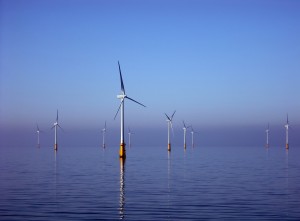
The University’s Graham Sustainability Institute, in partnership with the Kresge Foundation and Great Lakes Adaptation Assessment for Cities, held a conference at the University Tuesday through Thursday on issues of climate change in the Great Lakes region.
The conference included speakers and sessions focused both on the amount of resources in Michigan to combat potential threats to the Great Lakes from climate change in both the private and public sectors, as well as the importance of localized movements to affect individual change.
The Great Lakes Integrated Sciences and Assessments Center, one of the sponsors of the conference, also released a report a 13 page report Tuesday at the conference on the impacts of recent climate developments and transformations on the Great Lakes and surrounding area based on a synthesis of national climate change assessments. The GLISA report was a federally funded collaboration between the University of Michigan and Michigan State University.
In a press release, GLISA program manager Elizabeth Gibbons stated the organization’s hope was that the report would demonstrate the need for communities to begin thinking about how they interact with issues of climate change.
“The impacts of climate change are already being felt and will only increase in the years and decades to come,” Gibbons wrote.
The keynote speaker at the conference, Joyce Coffee, managing director of the Notre Dame Global Adaptation Index, spoke on the issue of climate change and adaptive action through the different options available to local government, corporations and nonprofits. She discussed what drives leaders in these sectors to take environmental action, and how research can become impactful and effect real change in the Great Lakes region.
According to Coffee, 70 percent of the corporations believe that climate disruption is a risk to their supply and value chains and 90 percent of companies note that sustainability is a part of business strategy. Coffee argued it is thus in the best interest of corporation, both for the stability of their product and the satisfaction of their customers, to take action toward environmental adaptation.
“Climate change is the humanitarian crisis of our time,” she said.
She emphasized that an increase in natural disasters results in significant fiscal losses for companies that rely on global supply.
Beyond the business sector, she also said local governments and cities stand to see a more financially strained future due to climate change, specifically in the Great Lakes region, and urged them to start dealing with these issues by adopting climate change action plans.
She cited several local impacts of global rises in temperature in her speech, including a rise in natural disasters that could put basic city infrastructure at risk, emergency services that could become strained due to larger, more frequent storms and the general inconvenience of excessive rain. Similar potential impacts were also raised in the GLISA report.
“Adaptation is about buildings, cities, families, employees, etc. It is incredibly local,” Coffee said, “Local government is an early actor, and adaptation often comes from political motivations.”
Coffee also discussed nonprofits briefly, and added that they shouldn’t be the only sector considered when it comes to solving climate change issues.
Missy Stults, a University research assistant who helped with the event, said the overall goal of the conference was to understand what lies ahead for the Great Lakes, especially in terms of climate change, and what that means for homes, businesses, and communities.
"It’s about what businesses do and why, and us making the business case for why taking action matters,” she said. “It’s about what local governments can do, and it’s also about what you and I can do in our lives to make sure that we are prepared and reducing our footprint. It’s all scales, all sectors, and it’s going to take all of us to do this.”
https://www.michigandaily.com/news/climate-change-emphasized-conference

